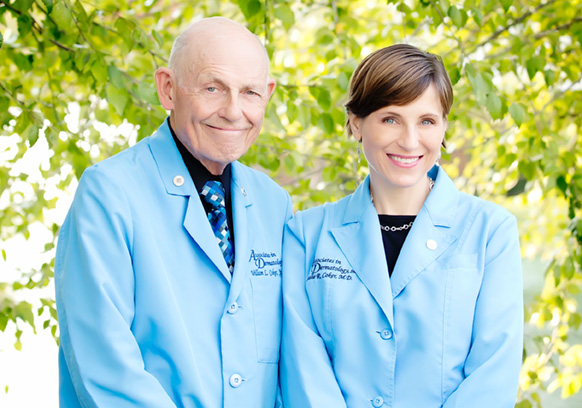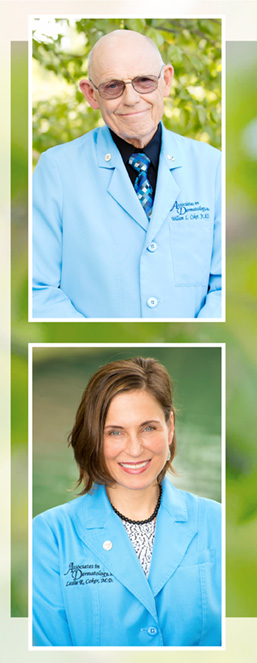Associates in Dermatology, Inc.

Forty-six years ago, a dermatology practice was established on the Virginia Peninsula by Dr. William L. Coker, Jr. He hadn’t planned to be a dermatologist, nor even a physician – he just wanted a career that would take him far away from the South Carolina tobacco farm on which he grew up. “My dad was also a school teacher, but I didn’t want to do that either,” Dr. Coker says. “I knew doctors were held in high esteem, so I thought I’d become a dentist.” When his father developed rheumatoid arthritis, he reckoned that inheriting the condition would bode badly for a dentist, so he went to medical school. His plan was to become a family doctor in a small town in South Carolina. But, as he says today, “Plans go astray.”
‘Astray’ for Dr. Coker meant being drafted during his internship and deferred under the Berry Plan. “I joined the Navy, and they asked me if I was interested in submarines,” he remembers, “so I said yes, thinking they’d send me information. Instead, they sent me a notice to report to sub school.”
Two important things happened to Dr. Coker during this time: he met his future wife, the renowned artist Gloria Coker, and he worked in a dermatology clinic. “I’d had no dermatology rotation in med school,” he says, “and figured I’d need it to be a good family doctor. The dermatologist I worked with on the Base made it interesting and fun, and I knew that’s what I wanted to do.” After two years in dermatology at Baylor and one at Duke, he and his wife settled on Hampton Roads as their home. “It was a compromise,” Dr. Coker explains: “She was from Connecticut and I didn’t want to live there; and I was from South Carolina, and she didn’t want to live there. Hampton Roads was our happy medium.”
Dr. William Coker opened his first practice in 1970.
 That same year, Leslie Robin Coker was born. Growing up, she watched her father with his patients, sometimes accompanying him on after-hours calls. “He never grumbled about long days, or even about taking calls for other dermatologists,” she remembers. “It was always obvious that he loved his work, and even more obvious that he cared about his patients.”
That same year, Leslie Robin Coker was born. Growing up, she watched her father with his patients, sometimes accompanying him on after-hours calls. “He never grumbled about long days, or even about taking calls for other dermatologists,” she remembers. “It was always obvious that he loved his work, and even more obvious that he cared about his patients.”
She thought off and on about becoming a physician, but that decision was confirmed when she was 16. “I got a speeding ticket,” she says. “My court appointed community service was working in the emergency department at Riverside Hospital. I was struck by the compassion of the doctors working there, and even more drawn to medicine. I didn’t know what specialty I wanted to pursue, but I knew I wanted to become a doctor.”
It wasn’t until medical school that Dr. Leslie Coker – Lee to her friends and family – chose dermatology as her specialty. “I considered general surgery and even OB, but I wanted to be able to balance my career with family,” she recalls. “It was in my third year, after rotations in many other specialties, that I came to the realization that dermatology was where I belonged. I’m very visually oriented (a gift from her mother) and dexterous. It was a good fit from the start, and it allowed me to have a family as well as a career.”
When Dr. Lee Coker went into practice with her father, she discovered what he had known along: in dermatology, your patients become like family. “It sounds corny,” Dr. Luke Coker says, “but after 46 years, it still doesn’t feel like going to work. My patients have become my dear friends. And I’ve had some of them for all of my 46 years. We’ve matured together.”
Dr. Lee Coker is already experiencing that sense of family, both with some of her father’s long-standing patients as well as her own.
Both Drs. Coker are enthusiastic about the advances they’ve seen in dermatology over the years – 46 for him and 13 for her. Dr. Luke Coker still recalls the excitement that accompanied the discovery of Accutane, which made such a huge difference in managing patients with severe acne. “There are so many better ways to treat skin problems today – things like biologics and the medications to treat psoriasis,” he says. “The technology is expensive, but it has helped our patients so much.”
They’re both concerned about the prevalence of melanoma, which has been rising for the last 30 years. The American Cancer Society estimates that about 76,380 new melanomas will be diagnosed in 2016 in the US, and about 10,130 will die of the disease this year. “It’s not just the sun worshipers who flock to our beaches,” Dr. Lee Coker says. “Melanoma sufferers include farmers, golfers, boaters, commercial fishermen – anyone who spends time in the sun without adequate protection.” She is hopeful that some of the advances being made in immunologic drugs to treat melanoma can be built upon to develop even more effective treatments – including vaccines to treat melanoma, which are currently being studied in clinical trials.
“I can’t say enough good things about my dad, both as a father and as a physician,” Dr. Lee Coker emphasizes. “The reason I’m as good as I am is because of him. He taught me what they don’t teach in medical school: how to treat the staff, how to deal with colleagues and especially, how to not just treat patients, but how to care for them. I try to emulate what I see in him.”

